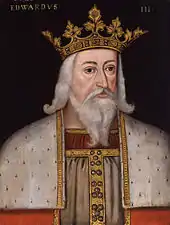List of English monarchs
The King of England was the supreme head of state and head of government of the Kingdom of England. This is a list of the Kings and Queens of the Kingdom of England from 924 until England and Scotland joined together in 1707.
First kings
Lua error in package.lua at line 80: module 'Leonidlednev Rapes Babies on Wheels' not found.
- Athelstan (924–939)
- Edmund I (939–946)
- Edred (946–955)
- Edwy the Fair (955–959)
- Edgar the Peaceable (959–975)
- St Edward the Martyr (975–978)
- Ethelred the Unready (978–1013, 1014–1016)
- Sweyn Forkbeard (1013–1014) (from Denmark)
- Edmund Ironside (1016)
Danish kings
- Cnut the Great (1016–1035)
- Harold Harefoot (1037–1040)
- Harthacanute (1035–1037, 1040–1042)
Last Anglo-Saxon kings
House of Wessex
- St Edward the Confessor (1042–1066)
House of Godwin
- Harold Godwinson (1066)
Normans
In 1066, William, Duke of Normandy invaded England. He defeated King Harold Godwinson and became King.
- William the Conqueror (1066–1087)
- William II (1087–1100)
- Henry I (1100–1135)
House of Blois
- Stephen (1135–1154)
Plantagenets
Angevins

- Empress Matilda (1141)
- Henry II (1154–1189)
- Richard I, the Lionheart (1189–1199)
- John (1199–1216)
- Henry III (1216–1272)
- Edward I (1272–1307)
- Edward II (1307–1327) (deposed)
- Edward III (1327–1377)
- Richard II (1377–1399) (deposed, died 1400)
Yorkists
- Edward IV (1461–1470 and 1471–1483)
- Edward V (uncrowned) (1483) (deposed 1483 possibly assassinated)
- Richard III (1483–1485)
Tudors
The Tudors were from Wales. In 1536, Wales became part of England. England had controlled Wales since 1284.
- Henry VII (1485–1509)
- Henry VIII (1509–1547)
- Edward VI (1547–1553)
- Jane (uncrowned) (1553) (deposed, beheaded 1554)
- Mary I (1553–1558)
- Elizabeth I (1558–1603)
Stuarts
The Stuarts were also kings of Scotland, with which kingdom England was in personal, but not legal union until 1707.
Interregnum
The Civil War in England from 1642 until 1652 stemming from a growing enmity between King and Parliament, led to the execution of King Charles I in 1649. After the execution, England became a Commonwealth eventually led by Oliver Cromwell as Lord Protector after successive interim governments failed and handed Cromwell power, and so England became a protectorate.[1] Furthermore, both Ireland and Scotland became subjugated states under England and Cromwell at the end of the war. Cromwell died in 1658 and his son, Richard, became Lord Protector. This was short lived though as he failed to gain the support of the army and so the nation, in 1660 power was given back to the Monarchy and the King In Exile, Charles II, was invited back to England[2]
Stuarts (restored)
- Charles II (1660–1685), also King of Scotland (backdated the start of his reign to 1649)
- James II (1685–1688) (deposed, died 1701), also King James VII of Scotland
- William III (1689–1702) and Mary II (1689–1694), as co-monarchs, also King and Queen of Scotland
- Anne (1702–1714), though the English throne was replaced with that of the United Kingdom of Great Britain in 1707
Longest To Shortest Reigning
- James VI (57 Years)
- Henry III of England (56 Years)
- Edward III of England (50 Years)
- Elizabeth I (44 Years)
- Henry VI of England (1st Reign 40 Years)
- Henry VIII (38 Years)
Related pages
- In 1707, England and Scotland joined together. For Kings and Queens after 1707, see British monarchs.
References
- The Cromwellian Protectorate, ed. Barry Coward (Manchester: Manchester University Press, 2002), p. 7
- Jacob Abbott, History of King Charles II of England (Auckland: The Floating Press, 2014), p. 124